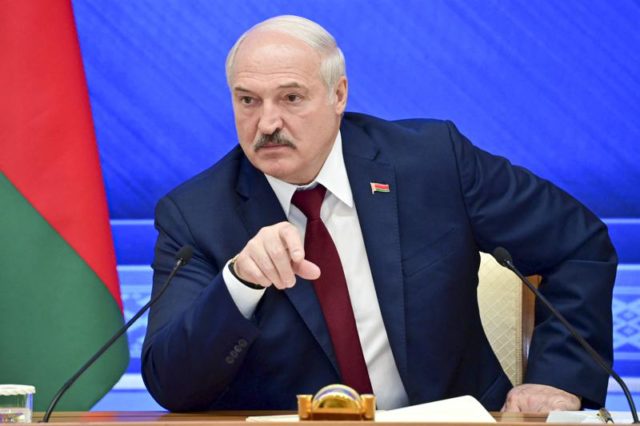
Lukashenka Says No to Russian Military Base and Deeper Integration With Russia
Publication: Eurasia Daily Monitor Volume: 18 Issue: 133
By:

In his marathon question-and-answer session on August 9, Belarusian President Alyaksandr Lukashenka again ruled out the integration of Belarus with Russia at the level of institutions as well as the stationing of Russian combat forces on Belarus’s territory (President.gov.by, August 9; see EDM, August 16).
Time and again during his over-eight-hour-long press conference, Lukashenka extolled “Belarus’s independence and sovereignty as highest values.” He declared, “It is my duty to ensure the security and preservation of this first sovereign state in Belarus’s multi-secular history.” This message carries a double address: to Russia and the West. Specifically to Russia: “You are our relatives, I have always adhered to this policy. But we are two independent and sovereign states. We achieved our independence and sovereignty after many centuries, our people value this very highly.”
Lukashenka made clear that he continues to expect Russian energy price discounts and budget-support credits in return for Belarus’s geopolitical loyalty. “We have a firm military-political alliance with Russia, we do not retreat from it even by one inch,” the Belarusian leader asserted. This give-and-take would preserve the long-established status quo in bilateral relations. Lukashenka would not willingly go into any deeper relations with Russia. He proclaimed, “Our long-term plans for military-political cooperation are fully laid down. I do not see the creation of a joint Belarusian-Russian army even beyond the horizon,” thus ruling out a re-subordination of Belarusian forces to Russian command. However, he contended, “there will be not just a Russian base but all of Russia’s armed forces will be here, if a world war threatens to break out”—the least likely scenario by far. “The idea of a Russian base here makes the West nervous […] but no such base is necessary,” he clarified, “I have long ago agreed with [Russian President Vladimir] Putin on this,” thus implicitly committing the Kremlin leader. “We are discussing the acquisition of Russian S-400 air-defense systems at market prices, on credit. Our own S-300s are also good, and we know how to modernize them,” he posited—a classical Lukashenka maneuver to avoid the actual placement of Russian air-defense units in Belarus.
Lukashenka continues using a counter-leverage that has served him well: “Russia does not have anybody else [as a European ally]. They might not like this, but facts are facts. […] There are only the two of us, Belarus and Russia.” On the strength of this argument, he resists any deepening of political relations with Russia. He stressed, “Some understand integration as the incorporation of Belarus into Russia… Any integration is doable, but not if it means the loss of sovereign statehood. We had about 30 integration road maps. Together with Vladimir Putin, we got rid of the one with political implications [apparently alluding to their July 13 meeting]. We are not losing anything, because we do not have supranational bodies but inter-governmental and inter-ministerial bodies.” Lukashenka went on to reject proposals about merging Belarus’s flagship industrial enterprises with their Russian counterparts.
While Russia views Belarus’s sovereignty as something to be whittled down, the West has long failed to respond by invoking Belarus’s inherent title to sovereignty vis-à-vis Russia. Even during periods of rapprochement between Belarus and the West, the latter did not speak out clearly for Belarusian sovereignty. Three factors can be discerned behind this abstention: ideological disfavor of the concept of sovereignty as such, reluctance to irritate Russia over Belarus, and the potential incompatibility of sovereignty with Western democracy-promotion, which is deemed to override state sovereignty.
The August 9 event marked one year since the rigged presidential election that sparked mass protests, excessive police force in response, Western non-recognition of Lukashenka as president, and isolation of his government. Nevertheless, the Belarusian authorities have, in recent months, regained full control of the internal political situation thanks to systematic repression of political opponents, a cohesion of the governmental and managerial class, the uninterrupted functioning of the paternalist social state, and the numerical gravitas of Lukashenka’s traditional constituencies in the population (see EDM, August 9).
Externally, however, Lukashenka’s government—and, beyond it, Belarus’s economy as such—is targeted with Western sanctions, seemingly designed to cause economic hardship and social unrest. Western sanctions, tightening incrementally, look like an undeclared policy aiming for regime change. Minsk is retaliating internally with more restrictions on political opponents who are deemed, rightly or wrongly, to be in league with the sanctions-imposing states (see EDM, June 30, July 7, 14, 29, August 10).
Belarus currently finds itself at the intersection of two regime-change projects in the making. One is the Kremlin’s project, initiated already in the run-up to the 2020 presidential election, and currently awaiting Belarus’s constitutional reform that Russia seeks to influence (see EDM, September 10, October 7, 8, 15, 16, 2020). The other regime-change project is being considered in the West through opposition leaders based there. The Kremlin-connected analyst Fyodor Lukyanov proposes, in effect, merging the two projects by agreement, adding—as the decisive element—the deployment of a Russian military base in Belarus (Russia in Global Affairs, August 10).



